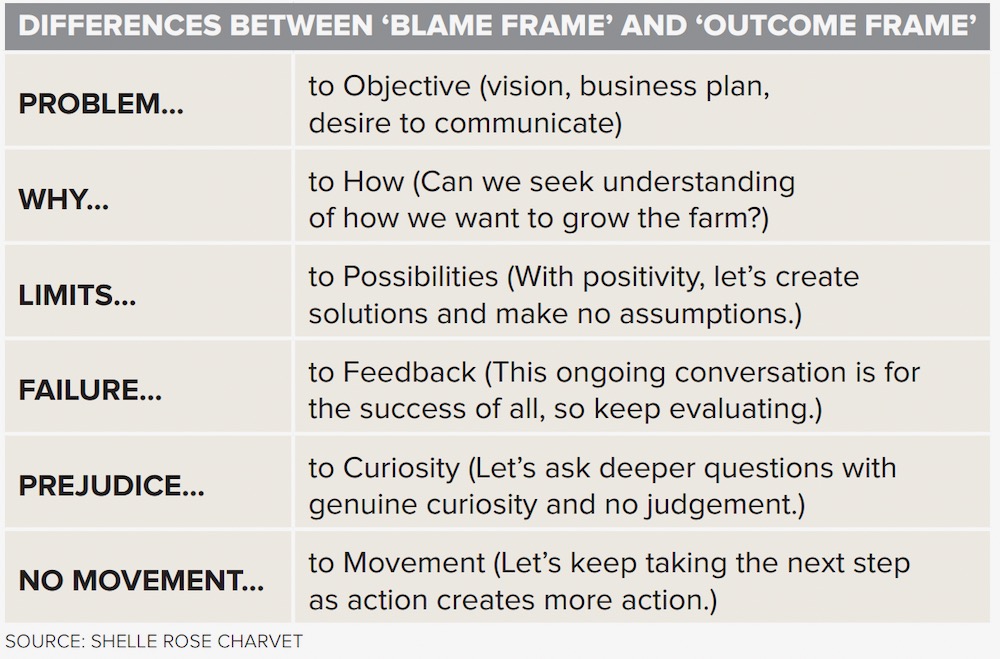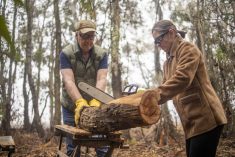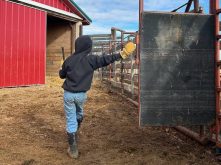Imagine this is the day you’re hopping out of bed with a new spring in your step as you anticipate the life-changing transaction taking place this afternoon. You, your spouse and your folks are headed to the lawyer’s office to officially sign shareholder agreements. You’re excited to finally have some certainty for your future. How are your parents feeling?
The ability to put yourself in the other person’s shoes is called “perspective taking.” This skill is a key proactive conflict-resolution behaviour. It’s a place where you don’t make assumptions — you learn to ask deeper questions, to seek to understand the other person’s perspective, interests, and concerns. You want to understand the other person’s point of view.
Read Also

Is the technology in our vehicles a help or a hindrance?
Not only does new tech allow people to operate vehicles and farm machinery with fewer skills, it also creates more problems for vehicle users when those systems fail, Scott Garvey writes.
For some young farmers who are waiting longer than expected to get some equity in the farm business, taking time to understand the other person’s point of view could be frustrating. It is necessary.
Imagine what the other person is trying to accomplish. Older farmers have heirs to the farm business, and non-farm heirs, to consider. They also are dealing with latent health issues, communication strains in the family dynamic and possible limiting beliefs. As the leaders of the farm, spouses may be in friction due to conflicting visions of the next chapter of their life. There is a lot going on when you start to unravel all the challenges.
I have a tool called the “key challenge audit” available online. Have each person in your family fill this out and then you’ll know what the important first conversations need to be.
Why bother trying to seek the other person’s point of view?
Once you can uncover the reasons why your folks are thinking in a certain direction, then you’ll have clues to continue increasing your knowledge base and ask better questions.
What is their desire for income streams for family living? Do they need to purchase new housing? What does fairness look like to you?
What is Dad’s desire for his new role as you take on more management? What roles are going to change for Mom? What does she want to continue to do, and what does she want to stop doing? Is there conflict between what Mom wants and what Dad wants to do with his time?
Making the other person feel you are taking their concerns seriously results in the other person feeling understood. This is a great breakthrough position for families who are longing for clarity of expectations and certainty of timelines for transition agreements.
What steps can you take to be more open-minded and curious?
Can you imagine how it feels for the founder to consider transferring wealth and decision-making to the next generation when there is fear of failure or fear of loss of wealth? You are wise to share your intention not to cause hurt in the conversations, yet the bigger picture is framing the “how” you are going to create solutions together for the good of all.
Consider the “outcome frame questionnaire” from Shelle Rose Charvet, a trainer in NLP (neuro-linguistic programming) and author of Words that Change Minds, shown here in this table.

Here’s some helpful phrases as you are practicing your sharing perspective.
- “I’ve been thinking…”
- “It is not my intent to cause hurt or more frustration, I am wondering how you would like to proceed on this transition journey. What’s helpful for you to understand?”
- “What do you think are some limiting beliefs we are hanging on to?”
- “We learn from our mistakes, so failure is not a bad thing. Can I give you some feedback on where I see we might be stuck?”
- “I’m just curious, what are you having a hard time understanding or letting go of?”
- “Tell me more…”
Remember your perspective-taking skill has a lot to do with your mindset. Follow these tips:
- Be curious as you are committed to the discovery and transition process.
- Recognize your impact on the culture of your farm: what you believe, how you behave, and how you make decisions.
- Choose your response carefully. We all get to make choices with our approach with others, our intent and options we create.
- Build a team of trusted advisors and seek out new supports with free discovery calls.
- Create an abundance mindset which enhances a fair exchange of value for great advice and good process.
- Be proactive, not reactive (I feel like throwing in the towel today!).
Mindset tips for young farmers:
- Know the numbers, income, debt loads and fair compensation.
- This is a journey, not an event: have perseverance, patience, positivity and be outcome focused.
- Block time for the process; be the driver for your equity goals.
- Challenge advisors and make sure there is accountability to keep to timelines.
- Protect working capital and have good debt.
You are responsible for making choices for your own life. Accept that solving problems is up to you. Take responsibility for improving the level of skill in sharing your ideas, thoughts and feelings in the culture of your farm business. Take charge and act. You’ll get nowhere if you continue to guess what the founders want. Don’t expect the communication problems to fix themselves.
Let’s work on walking a mile in the shoes of others on our farm team. A perspective shift can get you to that lawyer’s office sooner than you believe possible.
















